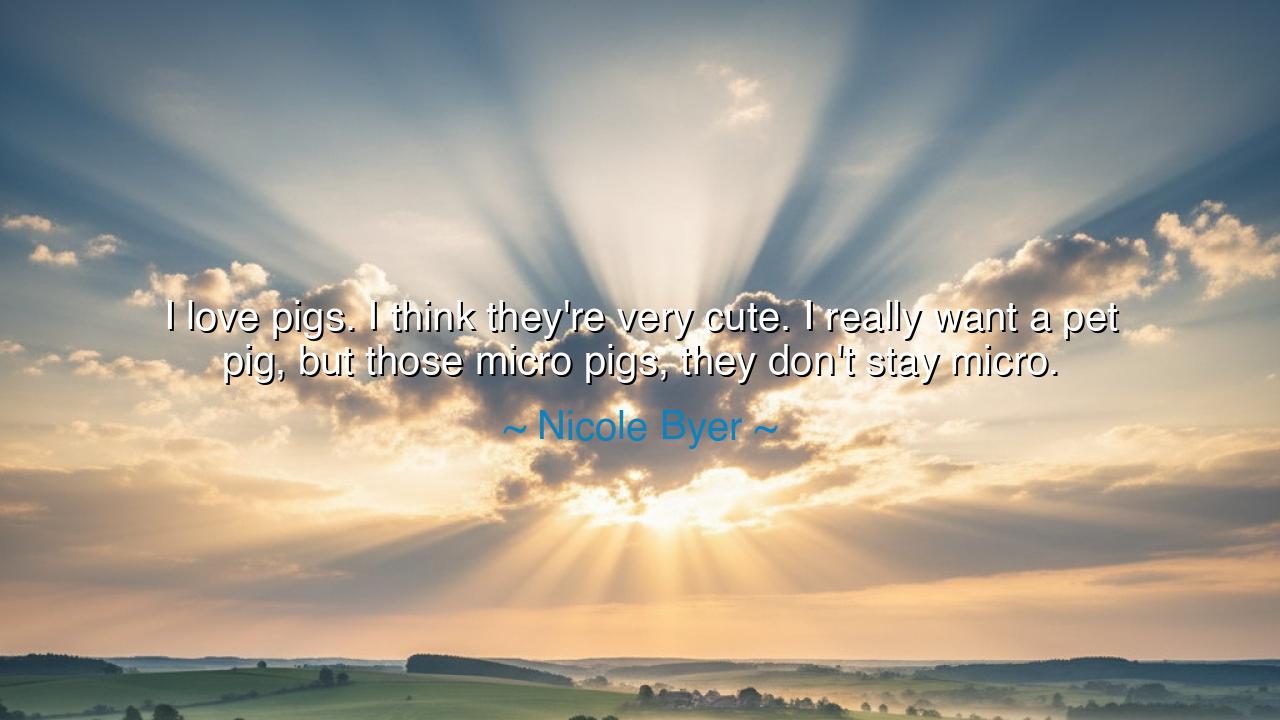
I love pigs. I think they're very cute. I really want a pet pig
I love pigs. I think they're very cute. I really want a pet pig, but those micro pigs, they don't stay micro.






Hear now the lighthearted yet profound words of Nicole Byer, who declared: “I love pigs. I think they’re very cute. I really want a pet pig, but those micro pigs, they don’t stay micro.” Though clothed in humor, her words reveal a deeper truth about the illusions of desire, the nature of growth, and the wisdom required to embrace reality rather than cling to fantasy. For in her jest lies the eternal teaching: things do not remain as we imagine them—they grow, they change, they reveal their true form.
The ancients often spoke of appearances versus reality. What begins small and manageable may grow vast and demanding. In this way, the micro pig is not only an animal, but a symbol of human longing for convenience without consequence, beauty without burden, love without responsibility. Byer reminds us, however, that no creature, no relationship, no dream remains “micro” forever. To love something is to accept its fullness, not only its beginnings.
Consider the tale of the emperor Charlemagne, who once received an elephant as a gift from distant lands. At first, the court marveled at the novelty, delighting in its exotic presence. But soon they realized the cost of its size—food, space, and care beyond measure. What seemed at first a treasure grew into a burden. Yet Charlemagne did not cast the animal aside; he bore the responsibility as part of his destiny. So too with the pig—or any creature we claim as our own—we must not cling to the fantasy of its “micro” state, but embrace the full reality of its life.
Byer’s affection for pigs is not mocked by her honesty; rather, it is made stronger. To see an animal’s true nature, to know that it will grow beyond cuteness and into size, and still to desire it—that is real love. Many fall in love with beginnings: the puppy, the seedling, the micro pig. Few are willing to love the fullness: the grown dog with needs, the tree with roots that crack the stone, the pig that outweighs its owner. Her words, in jest, teach us that to love rightly is to love wholly.
This saying also speaks to the illusions we often buy into—promises of the effortless, the eternal, the unchanging. Advertisements sell “micro pigs” as forever small, just as life sells us the illusion that joys can remain unaltered. But truth shatters illusion: growth is inevitable, change unavoidable. To cling to the fantasy is to prepare for disappointment; to accept reality is to prepare for wisdom. Thus, the pig becomes a parable of all life’s commitments.
The lesson is clear: do not fall in love with illusions of permanence. Embrace the fullness of reality, even when it grows heavy, inconvenient, or challenging. If you would take a pet, take it not for its size, but for its life. If you would take on love, take it not for its first sweetness, but for its enduring truth. This is the way of wisdom: to see clearly, and yet to choose love anyway.
Practically, this means entering commitments—whether of animals, friendships, or dreams—with open eyes. Ask not only, Do I love it now? but also, Can I love it when it grows, when it changes, when it is no longer convenient? Prepare for the fullness, not just the beginning. In so doing, you will spare yourself disillusionment and find the deeper joy that endures beyond the first charm.
So let this saying echo as a teaching: The micro will not remain micro. All things grow into their truth. If you would love, love not the illusion but the reality. For the one who embraces the whole—the small and the great, the easy and the hard—walks the path of enduring joy, and their love becomes strong enough to last a lifetime.






AAdministratorAdministrator
Welcome, honored guests. Please leave a comment, we will respond soon